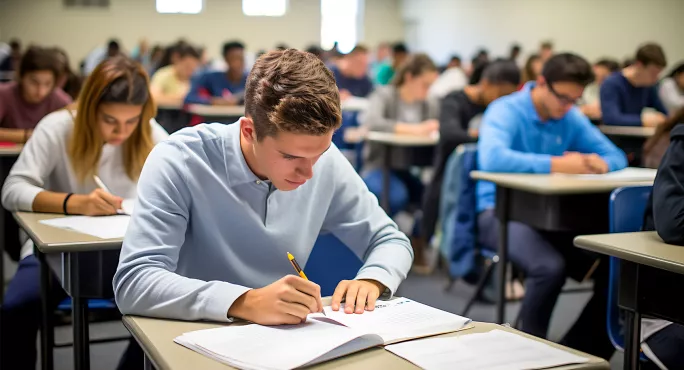
GCSE resits: everything you need to know

When GCSE results are released this August, many students will be looking forward to their next step - be that moving on to A levels, further vocational education, apprenticeships or employment.
But students who don’t quite get the grades they want may find themselves in a position where they need or want to retake an exam.
Whether they need to resit a GCSE in order to meet a course requirement and facilitate progress to the next stage of their educational journey or want to resit simply to improve their grade, there are some important points to be aware of.
When can students retake a GCSE exam?
Students can retake English language and maths GCSEs in November.
For other subjects, students will have to wait for the next summer series in 2026. The full dates are below.
What is a pass at GCSE?
All grades 1-9 are a “pass” grade. Exams regulator that a grade 4 is considered a standard pass and grade 5 a “good pass”.
Do students have to resit GCSE maths and/or English?
Students who fail to attain at least a grade 4 standard pass in English and/or maths will need to resit.
This is because a grade 4 in English and maths is expected of all students, and those who fail to achieve it the first time around must either or take another recognised qualification (see more on alternatives to GCSEs below). A student can also choose to retake any other GCSE but it is not a requirement.
The compulsory retaking of maths and English is controversial.
Speaking to Tes in response to the results of the November resits in 2024 - which showed a significant drop in candidates passing English language - Tom Middlehurst, then curriculum, assessment and inspection specialist at the Association of School and College Leaders, said: “There is clearly an urgent need to rethink the policy of mandatory resits as it obviously isn’t working.”
Do students have to pay to resit a GCSE?
If a student is required to take the GCSE resit in English and/or maths because they did not attain a grade 4 pass, they will not be expected to pay.
Students who wish to resit English and/or maths to improve their grade but who have already obtained a grade 4 pass or above will be expected to pay.
Students who wish to resit a GCSE in any subject other than English or maths will also be expected to pay, and may have to enter as private candidates.
In all cases, the best approach is to contact the institution the student is studying with and ask about payment options.
Will students’ resit grades be included in the school data?
If a student retakes a GCSE and achieves a higher or lower grade, the student can use whichever GCSE grade is higher.
With regards to Progress 8 scores and school league table positions, only the first grade awarded to students will count.
What happens if the resit grade is lower than the original?
If a student achieves a lower grade in their resit than in the summer series, this does not mean the student loses their higher grade. Instead, they can choose to use the higher of the two grades.

If a student resits multiple times, the highest of the grades can be used.
How many times can a student resit a GCSE?
There is no limit to the number of times a GCSE can be taken.
However, if a student fails to gain a grade 4 pass in English and/or maths GCSE after retaking the exam, the institution they are studying with may suggest taking .
How many students usually have to retake GCSEs?
In the November resit series in 2024 there were 77,005 entries for English language and 75,605 for maths. This included a total of from Year 12 students.
Total GCSE entries in November 2024 increased by 21 per cent, compared with the previous year, to 152,610.
Are GCSE resits marked in the same way as GCSEs?
For students sitting exams the following year, they will be marked as normal and judged against that year’s cohort.
For English and maths GCSE resits in the autumn term, although the marking is the same as the summer exams in terms of what is assessed, there is a difference in the method used for setting grade boundaries.
The method changes because, in the summer series, the decision about where the boundaries are set is partly informed by the cohort’s previous key stage 2 data, as this is used to predict how well the cohort should perform in the exam.
However, because the cohort for the autumn resits is made up of a smaller number of students without the same ability spread as the summer series, this data is not as useful. Instead, more weight is given to comparing papers against other scripts from the past summer series to form grade boundaries.
Ofqual says this approach means that it can ensure “it is no easier or harder to achieve a particular grade in any particular exam series”.
For more information about how grade boundaries are decided in resits, you can read Ofqual’s blog post .
What are the alternatives to GCSEs?
If you are unsuccessful in achieving a grade 4 pass in English or maths, there is the option of taking another recognised qualification.
The government’s explains how those under 18 will “have to retake GCSE English and maths” if they do not achieve a grade 4, but adds: “Depending on your circumstances, you may be eligible to take ľ±˛Ô˛őłŮ±đ˛ą»ĺ.”
Functional skills English and functional skills maths are online qualifications that can be taken at any age, and exam boards can offer them “on demand”. This means there is no fixed exam date and students can take them whenever they feel ready.
Qualifications in functional skills English and maths are offered by and .
topics in this article



